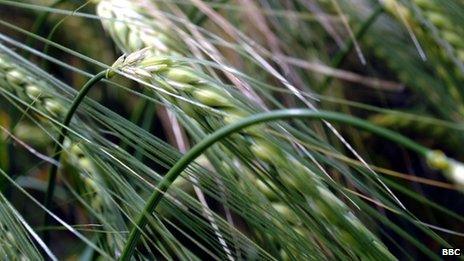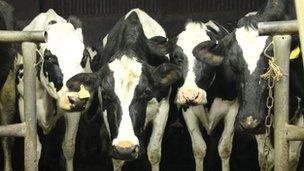Weather and disease take their toll on Midlands farming
- Published
- comments

Many farmers have given up on crops planted last autumn and have ploughed them up and planted new ones
Last year was not a great one for farming in the Midlands and as we approach the half-way point it doesn't look 2013 is going to be the year when things will turn around.
The two big areas of concern are animal diseases and the impact of the weather.
This week sees the publication of several statistics that show the problems farmers face.
The drought and then the soaking wet summer of 2012 has meant livestock farmers have had a hard time feeding their animals.
The grass in the fields has just not been of a good enough quality and giving your cattle and sheep extra food starts to push up costs.
Fewer lambs
So while the snowy weather in March directly led to the deaths of perhaps 60,000 lambs nationally, the overall lamb crop is down by more than one million because ewes were just not in the sort of condition farmers would like when having lambs.
On a diet of fairly poor grass the sheep have just had fewer lambs overall this year.
You can see a similar impact with dairy, with 2012 being described as "the worst year in living memory."
Once again because the grass in the fields was of a lower quality the cattle ended up producing a lot less milk, 8% less in April. Farmers can buy in extra food to try and push up milk production but that will erode any potential profit.

Dairy farmers said 2012 was "the worst year in living memory."
Finally, the weather has had a huge impact on arable farmers.
Many farmers have given up on crops planted last autumn and have ploughed them up and planted new ones, but even these aren't doing that well.
One sign to look out for in the Midlands is the lack of bright yellow oilseed rape fields. Instead, you see patches of yellow in a sea of green, or even worse patches of green and brown, bare-soil where the crop has failed to grow at all.
We've also seen problems with animal diseases.
At the start of the June we're going to see the first large scale cull of badgers in the Midlands as one of the measures to try to control the spread of bovine TB.
Wider impact
Currently 3,164 farms are under TB restrictions right now in the West of the country including the Midlands.
There's also the problem of the Schmallenberg virus which affects 287 Midlands farms.
So what does all this mean for shoppers? Well, the modern supermarket is a well-oiled machine and it's unlikely you'll see massive price rises or shortages.
But products are disappearing from our shelves as companies can't source British wheat of a high enough quality.
But for those parts of the Midlands that are closely linked with agriculture like Shropshire, all this is bad news.
Farming is five times more important to the economy here than it is in the wider UK. When times are this tough it can have a real impact in the community.